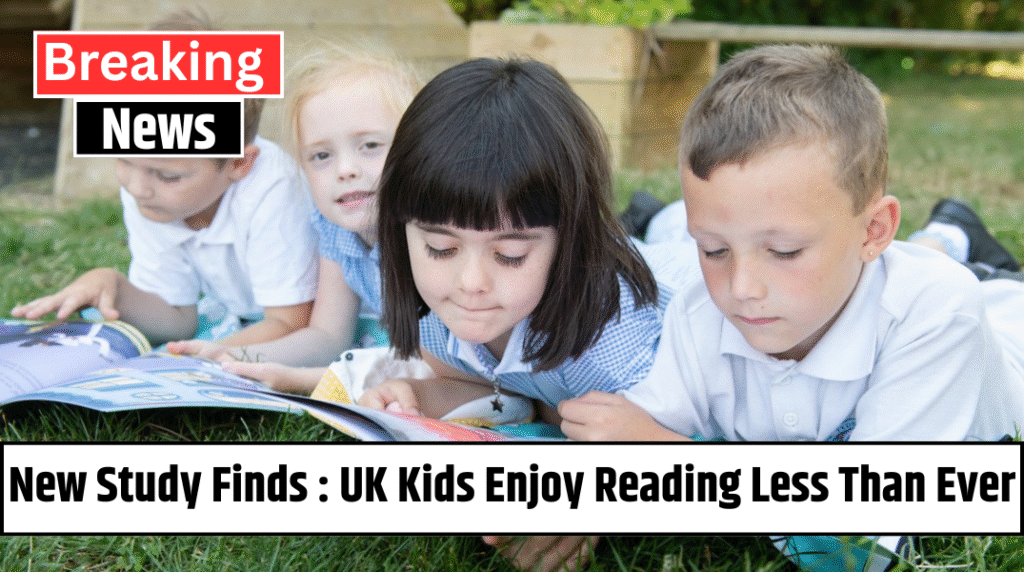Reading for pleasure among children and young people in the UK has declined to its lowest point in two decades, according to a new report from the National Literacy Trust (NLT). The drop is especially significant among boys aged 11 to 16, highlighting a deepening gender gap in reading enjoyment.
The annual survey, which included responses from 114,970 children and teens aged 5 to 18 across UK schools, paints a concerning picture: only 32.7% of those aged 8 to 18 said they enjoy reading “very much” or “quite a lot.” This marks a 36% drop since the survey began 20 years ago. Meanwhile, the number of young people who say they read something daily for leisure has been cut in half, plummeting from 38.1% to just 18.7%.
Girls vs Boys: A Growing Divide
The data revealed a stark contrast in reading enjoyment between genders. Among girls aged 8 to 18, 39.1% reported enjoying reading in their free time, compared with only 25.7% of boys. The gap was particularly wide in teenage years, with enjoyment levels among boys decreasing in nearly every age bracket.
Girls also tended to read for emotional well-being and support, while both boys and girls reported reading out of curiosity at similar levels.
Also Read – 1 in 5 Pupils in England Now Getting SEN Support, New Data Reveals
Why Are Fewer Kids Enjoying Reading?
Jonathan Douglas, CEO of the National Literacy Trust, warned that this downward trend threatens both literacy rates and young people’s future opportunities.
“We are seeing the lowest levels of reading enjoyment and daily reading in a generation. This is not just a literacy issue — it’s a matter of well-being and equity,” Douglas said. “We urgently need a cross-sector approach to reverse this decline.”
Yet, there is room for optimism. Many children who say they don’t enjoy reading admitted they would be more motivated if the content related to a film or TV series they liked (38.1%), or if it aligned with their personal interests or hobbies (37.1%). This suggests that tapping into pop culture and personal relevance could help reignite enthusiasm for reading.
What Drives Engagement — And What Doesn’t
Interestingly, just 2.7% of children who reported not enjoying reading said that joining a reading group or book club would motivate them — challenging the traditional notion that group activities encourage reading. The report noted that while book clubs may be effective for enthusiastic readers, they appear far less helpful for disengaged or reluctant ones.
Conversely, 30.9% of those with low reading interest said they are drawn to books by an appealing cover or title, indicating the importance of visual and first-impression factors in grabbing attention.
Little Impact from Economic Status, But Regional Differences Noted
Surprisingly, socioeconomic status had minimal impact on reading enjoyment. Among those eligible for free school meals, 31% said they enjoyed reading, compared with 33% of those who weren’t — suggesting that access to resources may not be the only barrier.
Regional variation, however, was more pronounced. In England, 33.2% of young people said they enjoyed reading for pleasure, compared to just 25.5% in Wales, 30.3% in Scotland, and 28.9% in Northern Ireland.
Also Read – Labour Urged to Revise Free School Meal Plan to Prevent Children Missing Out
Next Steps: Meeting Children Where They Are
The NLT’s findings point to a need for a fresh approach to nurturing literacy. Douglas emphasized that fostering a love of reading requires meeting children “where they are,” with content that reflects their lives, interests, and preferred formats.
“Reading doesn’t exist in a vacuum,” he said. “Whether it’s linked to a favorite show, a hobby, or a topic they’re passionate about, we must connect books to what children already love. That’s how we rebuild reading culture.”
As the UK faces a growing literacy gap, educators and policymakers are being urged to reimagine strategies — not only to promote reading but to make it feel relevant, empowering, and enjoyable for a new generation of young readers.



